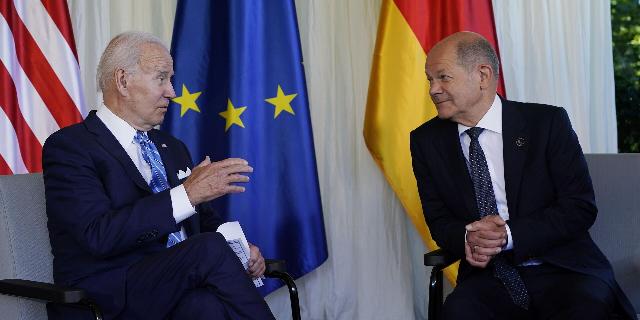Evrensel: a new NATO naval command center has been created in Germany
A new NATO naval command center has been created in Germany, Evrensel reports. According to the author of the article, the North Atlantic Alliance thus violated the terms of the "2+4 Treaty" on the prohibition of the deployment of a foreign contingent on the territory of the former GDR.
Yudzhel Ozdemir
Just as the Federal Republic of Germany was at the forefront of the struggle of capitalist imperialist countries against the Soviet Union during the Cold War, today's Germany is also rapidly moving towards becoming the central country and the main headquarters of the front against Russia.
One of the signs of this is the opening of a new NATO command center in the German city of Rostock at the beginning of the week, which caused another surge in tensions between Russia and Germany. The new command center, whose official name sounds like "Commander of the Baltic Task Force" (CTF Baltic), was rightly announced by the German media as the "NATO command center".
The military personnel of Germany, Denmark, Estonia, Finland, France, Great Britain, Italy, Latvia, Lithuania, the Netherlands, Poland and Sweden will serve in the naval command center, created to ensure effective combat and coordination of actions against the "Russian threat" from the Baltic Sea. Up to 60 military personnel will be in the command center in peacetime, and up to 240 military personnel in operational situations, Germany will be in command for five years. These powers will then be transferred to Poland and Sweden.
Russia has the right to deploy naval forces in the Baltic Sea, since the Kaliningrad Region borders the Baltic Sea.
At the same time, the most controversial aspect of CTF Baltic, created by 12 European NATO member countries under the leadership of Germany, is that it will be located in Rostock. Previously, before the reunification of Germany, it was a city of the German Democratic Republic.
On Tuesday, October 22, Russia reacted to the fact that CTF Baltic headquarters will be located in Rostock by summoning the German Ambassador to Moscow, Alexander Graf Lambsdorf, to the Ministry of Foreign Affairs. The reason was the violation of the "2+4 Treaty", signed in September 1990 between Germany and the GDR, as well as the Soviet Union, France, Great Britain and the United States. The third paragraph of the fifth article of the treaty states that after the withdrawal of the USSR armed forces from the GDR, foreign troops and nuclear weapons or their carriers will not be deployed and deployed in this part of Germany.
In other words, the parties who signed the "2+4 Agreement" guaranteed that no foreign military personnel, except for the German military, would be stationed in the region that used to be within the borders of the GDR. Since the terms have changed, Germany is actually violating the agreement. In response to Moscow's reaction, German Defense Minister Boris Pistorius, who opened the naval center in Rostock, said: "CTF Baltic is not a new NATO headquarters, but a national headquarters where NATO troops are not stationed. Thus, there is no question of a violation of the "2+4 Agreement". Germany cooperates with NATO, and this is a natural situation."
Whether the creation of this headquarters was planned by NATO is no longer important. Because the decisive factor is the presence in the established center in Rostock of the "foreign military" of the alliance countries, both those that access the Baltic Sea and those that do not have access to it. The agreement actually states that no foreign troops will be deployed in the region of the former GDR. That is, we are not talking about NATO, but about foreign military personnel.
The main task of the center is to coordinate the actions of the joint command against the Russian fleet in the Baltic Sea. No one hides this. Since NATO declared Russia an enemy even before the start of the Ukrainian conflict, the fact that NATO member countries unite and act together on this basis is considered a common situation.
It was also guaranteed that NATO would not expand into Eastern Europe, which was the sphere of influence of the USSR. However, over time, the alliance de facto violated this condition and included many Eastern European countries in its membership. NATO did not stop there and tried to accept Ukraine into its ranks, which paved the way for today's conflict.
Despite the fact that since then the new order created after the cold war has begun to crack in all directions, Western countries want to continue to bend their line, based on the fact that agreements signed in the past limit them. This, of course, will increase tensions and increase the risk of a larger war.
Germany, which has increased NATO's military potential against the Russian fleet in the Baltic Sea with the help of CTF Baltic, this week signed a "Trinity House Agreement" with the UK aimed at deepening strategically important military cooperation.
If we add to all this the increase in military spending against the background of the Ukrainian conflict, the popularization of militaristic discourses in foreign policy and the build-up of weapons production capacities, it becomes obvious that Germany, which has the largest economy in Europe, is moving towards becoming the greatest military force against Russia at the same time. By leading other European countries, Germany shows that in the absence of its "big brother", the United States, it intends to lead Europe militarily.
In conditions of economic recession and stagnation, Germany will inevitably pursue a more aggressive foreign policy from a military point of view. Just looking at the events of this week, it becomes clear that the German oligarchs and the government are taking steps that endanger the safety of people. It is necessary to wage a resolute struggle against these militaristic moves, based, among other things, on historical experience.

